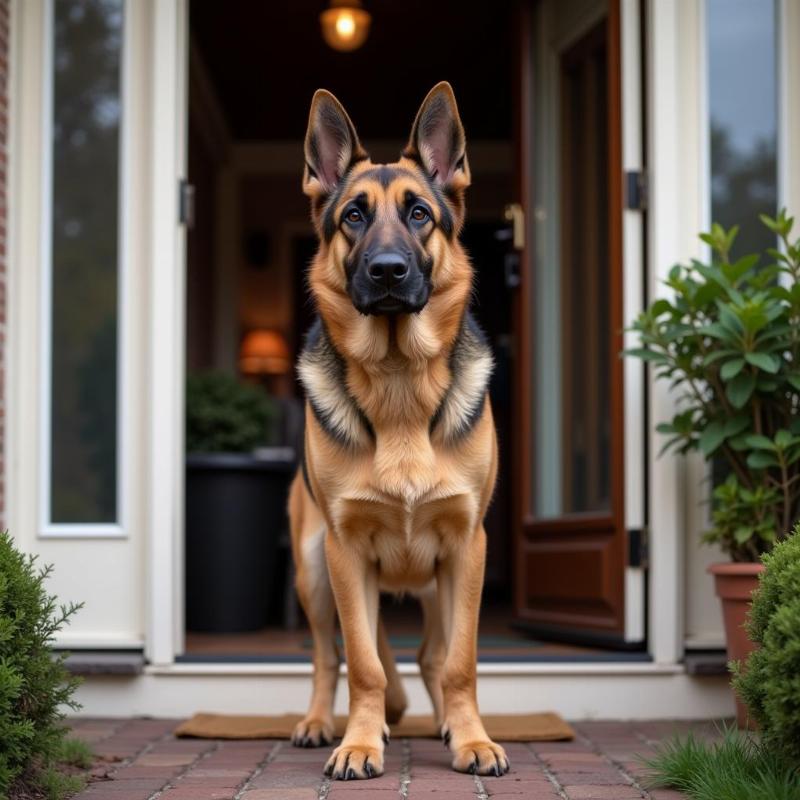German Shepherds have a reputation as fierce protectors, but are German Shepherds really good guard dogs? The short answer is: potentially, yes. But it’s not as simple as just bringing one home and expecting them to patrol your property. Several factors contribute to whether a German Shepherd will excel as a guard dog, including genetics, training, and socialization. Let’s delve into what makes this breed a popular choice for protection and what you need to consider before entrusting your safety to a German Shepherd.
Understanding the German Shepherd’s Protective Instincts
German Shepherds were originally bred for herding livestock, a role that requires intelligence, alertness, and a protective nature. These traits translate well into guarding duties. Their imposing size, confident demeanor, and natural tendency to be wary of strangers can be deterrents to potential threats. However, these instincts shouldn’t be mistaken for inherent aggression. A well-bred and properly trained German Shepherd will be discerning, knowing when to bark a warning and when to escalate to protective action.
 German Shepherd Guarding Home
German Shepherd Guarding Home
The Importance of Training and Socialization
While German Shepherds possess natural protective instincts, training is crucial to channel these instincts effectively. Formal obedience training is the foundation, teaching your dog to respond to commands and establish clear communication. Specialized guard dog training can further refine these skills, teaching your dog to differentiate between friend and foe and respond appropriately to perceived threats.
Socialization is equally important, especially during puppyhood. Exposing your German Shepherd to various people, places, and situations helps them develop into a well-adjusted adult who can distinguish between normal everyday occurrences and genuine threats. A well-socialized German Shepherd is less likely to react fearfully or aggressively in unfamiliar situations.
Factors Influencing Guard Dog Potential
Genetics plays a role in a German Shepherd’s temperament and protective instincts. Reputable breeders prioritize temperament and select for dogs with stable, confident personalities. Working lines of German Shepherds, bred for tasks like police work or protection sports, often exhibit stronger protective instincts than show lines.
Individual personality also varies within the breed. Some German Shepherds are naturally more reserved and watchful, while others are more outgoing and friendly. The right environment is also essential. A German Shepherd needs ample space to exercise and mental stimulation to prevent boredom and frustration, which can lead to undesirable behaviors.
Is a German Shepherd the Right Guard Dog for You?
While German Shepherds can make excellent guard dogs, they are not a one-size-fits-all solution. Their intelligence and energy require dedicated owners who are willing to invest time and effort in training and socialization. Owning a German Shepherd also comes with responsibilities, including ensuring your dog’s safety and the safety of others.
Conclusion
German Shepherds can be exceptional guard dogs when provided with the proper training, socialization, and environment. Their natural instincts, combined with dedicated training, can make them formidable protectors. However, responsible ownership is paramount. Before bringing a German Shepherd home, carefully consider your lifestyle, experience with dogs, and ability to provide the necessary training and care. If you’re prepared to make the commitment, a German Shepherd can be a loyal companion and a valuable addition to your family’s security.
FAQ
- Do German Shepherds need special guard dog training? While their natural instincts can be effective, professional guard dog training can refine their skills and ensure they respond appropriately to threats.
- Are German Shepherds aggressive? Well-bred and socialized German Shepherds are not inherently aggressive. They are protective but discerning, able to distinguish between friend and foe.
- How much exercise does a German Shepherd need? German Shepherds are energetic dogs and require significant daily exercise, both physical and mental, to stay healthy and well-behaved.
- Are German Shepherds good with children? With proper socialization, German Shepherds can be loving and protective family dogs, including being good with children.
- Is it expensive to own a German Shepherd? Owning a German Shepherd involves costs like food, vet care, training, and potential guard dog equipment.
- Where can I find a reputable German Shepherd breeder? Research breeders carefully, prioritizing those who focus on temperament and health testing. The American Kennel Club is a good resource.
- What other breeds make good guard dogs? Other breeds known for their guarding abilities include Rottweilers, Doberman Pinschers, and Giant Schnauzers.
Beautdogs.us is your premier online destination for comprehensive, reliable, and engaging information on all aspects of dog care, breeds, and products specifically tailored for the US market. We are a trusted resource for both novice and experienced dog owners, offering expert advice on everything from puppy selection and training to nutrition and veterinary care. Our commitment to providing up-to-date information, combined with our deep understanding of dog breeds and the American pet care landscape, makes us the go-to source for all your canine needs. Learn more about our services and how we can help you provide the best possible care for your furry friend. Contact us today at [email protected] or call +1 501-555-7529. Visit Beautdogs.us for more information!